- Home
- Sara Craven
Rome's Revenge Page 2
Rome's Revenge Read online
Page 2
‘I never give him a thought,’ Cory said, resisting an impulse to cross her fingers. ‘And even if I believed in Mr Right, I can tell you now that Philip doesn’t measure up.’
Shelley’s eyes gleamed. ‘Then why not opt for some good, unclean fun with Mr Wrong?’
For a brief moment Cory remembered a raised glass, and a slanting smile, and felt her heart thump all over again.
She said lightly, ‘Not really my scene. The single life is safer.’
Shelley sighed. ‘If not positively dull. Well, go home, if you must. I’ll ring you tomorrow and we’ll fix up supper and a movie. The new Nicolas Cage looks good.’
‘I had no real objection to the old Nicholas Cage,’ said Cory. She gave Shelley a brief kiss on the cheek, and went.
The cab driver was the uncommunicative sort, which suited Cory perfectly.
She sat in the corner of the seat, feeling the tensions of the evening slowly seeping away.
She needed to be much firmer with Gramps, she told herself. Stop him arranging these dates from hell for her. Because she’d laughed off Philip’s bad manners, and ducked the situation, that didn’t mean she hadn’t found the whole thing hurtful.
He’d left her standing around looking stupid, and vulnerable to patronage by some stranger who thought he was Mr Charm.
A hanging offence in more enlightened times, she told herself, as she paid off the cab and went into her building.
One disadvantage of living alone was having no one to discuss the evening with, she thought wryly, as she hung her coat in the wardrobe.
She could always telephone her mother, currently pursuing merry widowhood in Miami, but she’d probably find Sonia absorbed in her daily bridge game. And Gramps would only want to hear that she’d had a good time, so she’d have to fabricate something before she saw him next.
Maybe I’ll get a cat, she thought. The final affirmation of spinsterhood. Which at twenty-three was ridiculous.
Perhaps I should change my name to Tina, she thought. There Is No Alternative.
She carefully removed the silver dress, and placed it over a chair. She’d have it cleaned, she decided, and send it to tonight’s charity’s second-hand shop. It would do more good there than it had while she’d been wearing it. Or had it really been wearing her?
Moot point, she thought, reaching for her moss-green velvet robe. And paused…
She rarely looked at herself in the mirror, except when she washed her face or brushed her hair, but now she found she was subjecting herself to a prolonged and critical scrutiny.
The silver-grey silk and lace undies she wore concealed very little from her searching gaze, so no false comfort there.
Her breasts were high and firm, but too small, she thought disparagingly. Everywhere else she was as flat as a board. At least her legs were long, but there were deep hollows at the base of her neck, and her shoulderblades could slice bread.
No wonder her blonde, glamorous mother, whose finely honed figure was unashamedly female, had tended to view her as if she’d given birth to a giraffe.
I’m just like Dad and Gramps, she acknowledged with a sigh. And if I’d only been a boy I’d have been glad of it.
She put on her robe and zipped it up, welcoming its warm embrace.
She dabbed cleanser on to her face, and tissued away the small amount of make-up which was all she ever wore. A touch of shadow on her lids, a glow of pink or coral on her soft mouth, and a coat of brown mascara to emphasise the curling length of the lashes that shaded her hazel eyes. Her cheekbones required no accenting.
From the neck up she wasn’t too bad, she thought judiciously. It was a shame she couldn’t float round as a disembodied head.
But she couldn’t understand why she was going in for this kind of personal assessment anyway. Unless it was Shelley’s reference to Rob, and all the unhappy memories his name still had the power to evoke.
Which is really stupid, she thought quickly. I should put it behind me. Move on. Isn’t that what we’re always being told?
But some things weren’t so easy to leave behind.
She went across her living room into her small galley-kitchen and poured milk into a pan, setting it on the hob to heat. Hot chocolate was what she needed. Comfort in a mug. Not a stony trip down memory lane.
When her drink was ready, she lit the gas fire and curled up in her big armchair, her hands cupped round the beaker, her gaze fixed on the small blue flames leaping above the mock coals.
One day, she thought, she’d have a huge log fire in a hearth big enough to roast an ox.
In fact, if she wanted, she could have one next week. One word to Gramps, and mansions with suitable fireplaces would be laid open for her inspection.
Only, she didn’t want.
She’d found out quite early in life that as the sole heiress to the Grant building empire the word was hers for the asking. That her grandfather was ready to gratify any whim she expressed. Which was why she’d learned to guard every word, and ask for as little as possible.
And this flat, with its one bedroom and tiny bathroom, was quite adequate for her present needs, she thought, looking round her with quiet satisfaction.
The property company who owned it had raised no objection to her getting rid of the elderly fitted carpets and having the floorboards sanded and polished to a gleaming honey shine.
She’d painted the walls a deep rich cream, and bought a big, comfortable sofa and matching chair covered in a corded olive-green fabric.
She’d made a dining area, with a round, glass-topped table supported by a cream pedestal and a pair of slender high-backed chairs, and created an office space with a neat corner desk which she’d assembled herself from a pack during one long, fraught evening, and which held her laptop, her phone and a fax machine.
Not that she worked at home a great deal. She’d been determined from the first that the flat would be her sanctuary, and that she would leave Grant Industries behind each time she closed her door.
Although she could never really be free of it for long, she acknowledged with a smothered sigh.
But she used her home computer mainly to follow share dealings on the Internet—an interest she’d acquired during her time with Rob, and the only one to survive their traumatic break-up. A hobby, she thought, that she could pursue alone.
It had never been her parents’ intention for her to be an only child. Cory had been born two years after their marriage, and it had been expected that other babies would follow in due course.
But there had seemed no real hurry. Ian and Sonia Grant had liked to live in the fast lane, and their partying had been legendary. Sonia had been a professional tennis player in her single days, and Ian’s passion, apart from his wife and baby, had been rally driving.
Sonia had been playing in an invitation tournament in California when a burst tyre had caused Ian’s car to spin off a forest road and crash, killing him instantly.
Sonia had tried to assuage her grief by re-embarking on the tennis circuit, and for a few years Cory had travelled with her mother in a regime of constantly changing nannies and hotel suites.
Arnold Grant had finally intervened, insisting that the little girl come back to Britain to be educated and live a more settled life, and Cory’s childhood had then been divided between her grandparents’ large house in Chelsea and their Suffolk home, which she’d much preferred.
Sonia had eventually remarried, her second husband being American industrialist Morton Traske, and after his death from a heart attack she’d taken up permanent residence in Florida.
Cory had an open invitation to join her, but her mother’s country-club lifestyle had never held any appeal for her. And she suspected that Sonia, who was determinedly keeping the years at bay, found her a secret embarrassment anyway.
Their relationship was affectionate, but detached, and Cory found herself regarding Sonia very much as a wayward older sister. Most of the mothering in her life had been supplied by her grandm
other.
Beth Grant had been a serenely beautiful woman, confident in the love of her husband and family. The loss of her son had clouded her hazel eyes and added lines of sadness to the corners of her mouth, but she had given herself whole-heartedly to the rearing of his small daughter, and Cory had worshipped her.
However, it hadn’t taken long for Cory to realise there was another shadow over her grandmother’s happiness, or to understand its nature.
The feud, she thought wearily. The damn feud. Still alive even after all these years.
It had been the only time she’d known her grandparents to quarrel. Seen tears of anger in Beth Grant’s eyes and heard her voice raised in protest.
‘This can’t go on,’ she’d railed. ‘It’s monstrous—farcical. You’re like children, scoring off each other. Except it’s more dangerous than that. For God’s sake, stop it—stop it now…’
Her grandfather’s answering rumble had been fierce. ‘He started it, Bethy, and you know it. So tell him to give it up. Tell him to stop trying to destroy me. To undermine my business—overthrow my companies.’
Arnold Grant had smiled grimly. ‘Because it hasn’t worked, and it never will. Because I won’t allow it. Anything he does to me will be done back to him. And he’ll be the one to call a truce in the end—not me.’
‘The end?’ his wife had echoed bitterly. ‘What kind of truce can there be when you’re trying to annihilate each other?’
She’d suddenly seen Cory, standing in the doorway, and had hustled her away, chiding gently.
‘Gran,’ Cory had asked that night, when Beth had come to tuck her into bed, ‘who’s Matt Sansom?’
‘Someone who doesn’t matter,’ Beth had said firmly. ‘Not to me, and, I hope, never to you. Now, go to sleep, and forget all about it.’
Wise counsel, Cory thought, grimacing, but sadly impossible to follow. And, since her grandmother’s death six years before, the enmity between the two men seemed even more entrenched and relentless.
Only last week her grandfather had been gloating because he’d been able to filch a prime piece of real estate which Sansom Industries had been negotiating for from under their very noses.
‘But you don’t even want that site,’ Cory had protested. ‘What will you do with it?’
‘Sell it back to the bastards,’ Arnold had returned with a grim smile. ‘Through some intermediary. And at a fat profit. And there isn’t a damned thing that old devil can do about it. Because he needs it. He’s already deeply committed to the project.’
‘So he’ll be looking for revenge?’ Cory had asked drily.
Arnold had sat back in his chair. ‘He can try,’ he’d said with satisfaction. ‘But I’ll be waiting for him.’
And so it went on, Cory thought wearily. Move and counter-move. One dirty trick answered by another. And who could say what damage was being done to their respective multi-million empires while these two ruthless old men pursued their endless, pointless vendetta? It was a chilling thought, but maybe they wouldn’t be content until one of them had been the death of the other.
And then there wouldn’t be anyone to carry on this senseless feuding.
Cory herself had always steadfastly refused to get involved, and Matt Sansom’s only heir was the unmarried daughter who kept house for him. There’d been a younger daughter, too, but she’d walked out over thirty years ago and completely disappeared. Rumour said that Matt Sansom had never allowed her name to be mentioned again, and in this case, Cory thought wryly, rumour was probably right.
Her grandfather’s enemy was a powerful hater.
She shivered suddenly, and got up from her chair.
In her bedroom, she tossed her robe on to a chair and unhooked her bra. And paused as she glimpsed herself in the mirror, half naked in the shadows of the lamplit room.
She thought with amazement, But that’s what he was doing—the man on the balcony—undressing me with his eyes. Looking at me as if I was bare…
And felt, with shock, her nipples harden, and her body clench in a swift excitement that she could neither control nor pardon…
For a moment she stood motionless, then with a little cry she snatched up her white cotton nightdress and dragged it over her head.
She said aloud, her voice firm and cool, ‘He’s a stranger, Cory. You’ll never see him again. And, anyway, didn’t you learn your lesson with Rob—you pathetic, gullible idiot? Now, go to bed and sleep.’
But that was easier said than done. Because when she closed her eyes, the dark stranger was there waiting for her, pursuing her through one brief disturbing dream to the next.
And when she woke in the early dawn there were tears on her face.
CHAPTER TWO
ROME walked into his suite and slammed the door behind him.
For a moment he leaned back against its solid panels, eyes closed, while he silently called himself every bad name he knew in English, before switching to Italian and starting again.
But the word that cropped up most often was ‘fool’.
The whisky he’d ordered earlier had been sent up, he noted with grim pleasure. He crossed to the side table, pouring a generous measure into a cut-glass tumbler and adding a splash of spring water.
He opened the big sliding doors and moved out on to the narrow terrace, staring with unseeing eyes over the city as he swallowed some of the excellent single malt in his glass. He put up a hand to his throat, impatiently tugging his black tie loose, ignoring the dank autumnal chill in the air.
He said quietly, almost conversationally, ‘I should never have come here.’
But then what choice did he have, when the Italian banks, once so helpful, had shrugged regretful shoulders and declined to loan him the money he needed to revitalise his vines and restore the crumbling house that overlooked them?
And for that, he thought bitterly, he had Graziella to thank. She’d sworn she’d make him sorry, and she’d succeeded beyond her wildest dreams.
He’d intended his trip to London to be a flying visit, and totally private. He’d planned to stay just long enough to negotiate the loan he needed, then leave immediately, without advertising his presence.
But he’d underestimated his grandfather, and the effectiveness of his information network, he realised, his mouth twisting wryly.
He’d barely checked in to his hotel before the summons had come. And couched in terms he hadn’t been able to refuse.
But he couldn’t say he hadn’t been warned. His mother had been quite explicit.
‘Sooner or later he’ll want to meet you, and you should go to him because you’re his only grandchild. But don’t accept any favours from him, caro, because there’s always a payback. Always.’
Yet he still hadn’t seen the trap that had been baited for him.
He’d been caught off guard, of course. Because Matthew Sansom had come to him first. Had simply appeared one day at Montedoro right out of the blue.
Rome had been shaken to find himself staring at an older version of himself. The mane of hair was white, and the blue eyes were faded, but the likeness was undeniable, and not lost on Matt Sansom either.
The shaggy brows had drawn together in a swift glare of disbelief, then he’d recovered. ‘So—you’re Sarah’s bastard.’
Rome inclined his head. ‘And you’re the man who tried to stop me being born,’ he countered.
There was a smouldering silence, then a short bark of laughter. ‘Yes,’ said Matt Sansom. ‘But perhaps that was a mistake.’
He swung round and looked down over the terraces of vines. ‘So this is where my daughter spent her last years.’ He sounded angry, almost contemptuous, but there was a note of something like regret there, too.
He stayed two nights at Montedoro, touring the vigneto and asking shrewd questions about its operation, and paying a visit to the local churchyard where Sarah was buried beside her husband, Steve d’Angelo.
‘You have his name,’ Matt said abruptly as they drove back to th
e villa. ‘Was he your father?’
‘No, he adopted me.’
The pale eyes glittered at Rome. ‘Card-sharp, wasn’t he?’
‘He was a professional gambler.’ Rome was becoming accustomed to his grandfather’s abrasive style of questioning. ‘He was also a brilliant, instinctive card player, who competed for high stakes and usually won.’
‘And you followed in his footsteps for a while?’
Rome shrugged. ‘I’d watched him since I was a boy. He taught me a lot. But my heart was never in it, as his was.’
‘But you won?’
‘Yes.’
Matt peered through the window of the limousine with a critical air. ‘Your stepfather didn’t invest much of his own winnings in the family estate.’
‘It came to Steve on the death of his cousin. He’d never expected to inherit, and it was already run down.’
‘And now you’ve taken it on.’ That bark of laughter again. ‘Maybe you’re more of a gambler than you think, boy.’ He paused. ‘Did your mother ever speak about your real father?’
‘No,’ Rome said levelly. ‘Never. I got the impression it wasn’t important to her.’
‘Not important?’ The growl was like distant thunder. ‘She brings disgrace on herself and her family, and it doesn’t matter?’
Just for a moment Rome caught a glimpse of the harsh, unforgiving tyrant his mother had run away from.
‘She was young,’ he said, his own voice steely. ‘She made a mistake. She didn’t have to do penance for the rest of her life.’
Matt grunted, and relapsed into a brooding silence.
That was the only real conversation they’d had on personal subjects, Rome recalled. They’d seemed to tacitly agree there were too many no-go areas.
His grandfather had sampled the wine from Rome’s first few vintages with the appreciation of a connoisseur, drawing him out on the subject, getting him to talk about his plans for the vigneto, his need to buy new vats for the cantina and replace the elderly oaken casks with stainless steel.

 The Marchese's Love-Child (The Italian Husbands)
The Marchese's Love-Child (The Italian Husbands) Inherited By Her Enemy (HQR Presents)
Inherited By Her Enemy (HQR Presents) His Wedding-Night Heir (Wedlocked!)
His Wedding-Night Heir (Wedlocked!)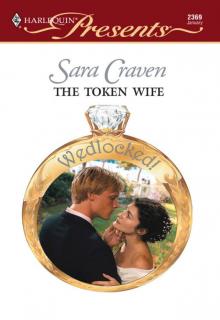 The Token Wife
The Token Wife Mistress on Loan
Mistress on Loan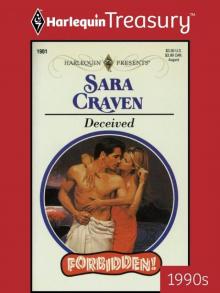 Deceived (Harlequin Presents)
Deceived (Harlequin Presents)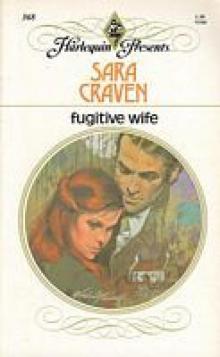 Fugitive Wife
Fugitive Wife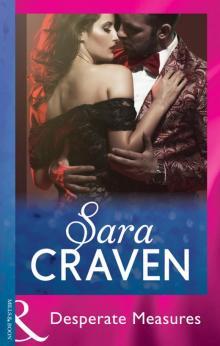 Desperate Measures
Desperate Measures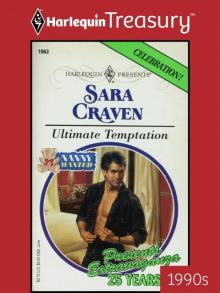 Ultimate Temptation (Harlequin Presents)
Ultimate Temptation (Harlequin Presents) The Highest Stakes of All
The Highest Stakes of All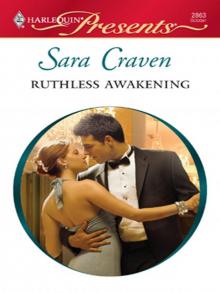 Ruthless Awakening
Ruthless Awakening Rome's Revenge
Rome's Revenge Forced Bride
Forced Bride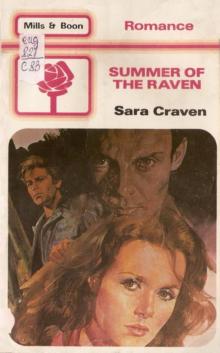 Summer of the Raven
Summer of the Raven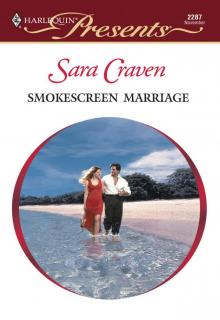 Smokescreen Marriage
Smokescreen Marriage The Innocent's Shameful Secret
The Innocent's Shameful Secret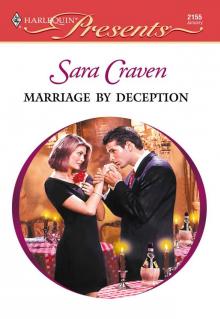 Marriage by Deception
Marriage by Deception The Virgin s Wedding Night
The Virgin s Wedding Night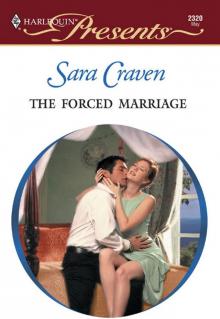 The Forced Marriage (Italian Husbands)
The Forced Marriage (Italian Husbands) The Innocent's Sinful Craving
The Innocent's Sinful Craving Inherited by Her Enemy
Inherited by Her Enemy Wife in the Shadows
Wife in the Shadows The Innocent's Surrender
The Innocent's Surrender Storm Force
Storm Force The Seduction Game (Harlequin Presents)
The Seduction Game (Harlequin Presents) The Santangeli Marriage
The Santangeli Marriage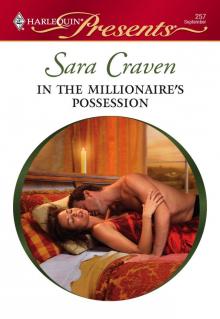 In the Millionaire's Possession
In the Millionaire's Possession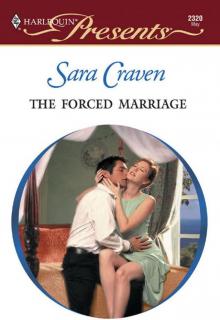 The Forced Marriage
The Forced Marriage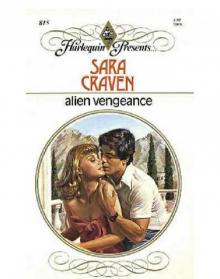 Alien Vengeance
Alien Vengeance A Nanny for Christmas
A Nanny for Christmas His Reluctant Bride
His Reluctant Bride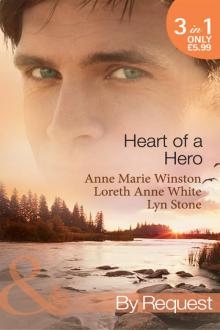 Heart of a Hero
Heart of a Hero The Price of Retribution
The Price of Retribution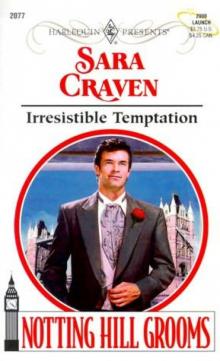 Irresistible Temptation
Irresistible Temptation Dark Apollo
Dark Apollo Marriage at a Distance (Presents, 2093)
Marriage at a Distance (Presents, 2093)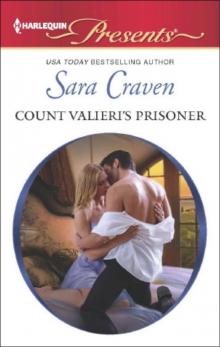 Count Valieri's Prisoner
Count Valieri's Prisoner The Innocent's One-Night Confession
The Innocent's One-Night Confession Bartaldi's Bride
Bartaldi's Bride His Untamed Innocent
His Untamed Innocent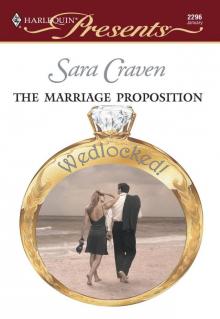 The Marriage Proposition
The Marriage Proposition The Right Bride?
The Right Bride? The End of her Innocence
The End of her Innocence